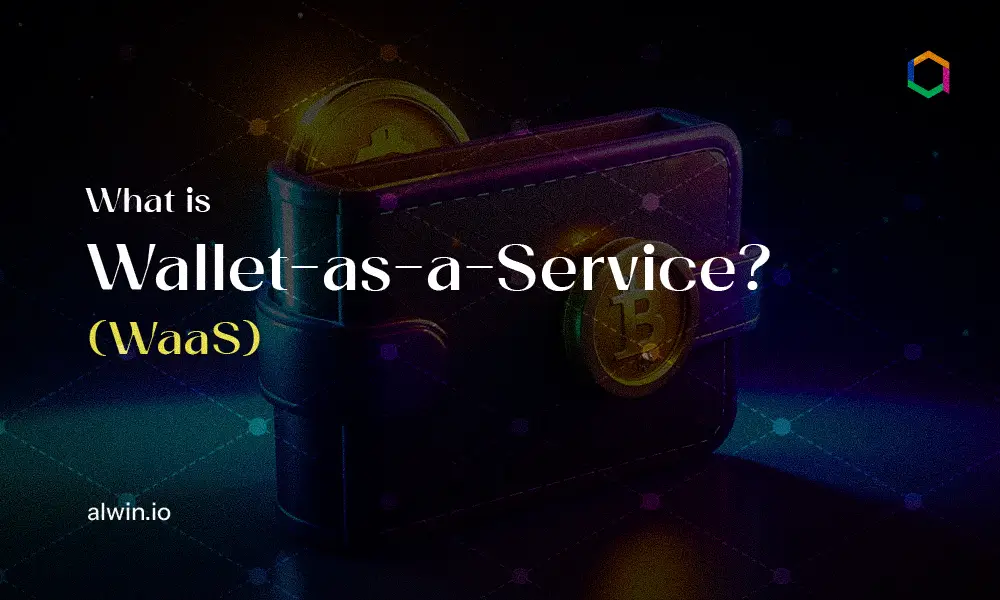Imagine you want to launch a new fintech app that allows users to store, send, and receive digital assets like cryptocurrencies. Traditionally, you’d need to build an entire wallet system from scratch a costly and time-consuming process that requires deep expertise in security, compliance, and blockchain technology. This is where Wallet as a Service (WaaS) comes in.
WaaS is a game-changer in the financial and blockchain industries, allowing businesses to integrate digital wallets into their platforms without the hassle of developing the infrastructure themselves. With WaaS, companies can offer secure, user-friendly wallets to their customers while relying on a third-party provider to handle the technical complexities.
In simple terms, think of WaaS as a "ready-made wallet" solution. Just like Software as a Service (SaaS) provides businesses with cloud-based software applications, WaaS delivers secure and scalable wallet functionality as a service without needing businesses to build everything from scratch. This means faster go-to-market, reduced costs, and enhanced security features, making it an attractive option for startups and enterprises alike.
In this guide, we’ll explore how WaaS works, its benefits, its key features, and how businesses can leverage it to enhance their offerings. Whether you’re a fintech entrepreneur, a blockchain enthusiast, or just curious about digital wallets, this article will break it all down in a simple, easy-to-understand way. Let’s dive in!
What are Crypto Wallets?
You might have already used a physical wallet to store cash, credit cards, or IDs, then understanding crypto wallets becomes are much easier. Just like your real-world wallet holds money, a crypto wallet stores your digital assets like Bitcoin, Ethereum, or NFTs. However, instead of holding physical cash, a crypto wallet stores private keys, which are like secret passwords that give you access to your cryptocurrencies.
Real-Life Example for Better Understanding
Imagine your crypto wallet as a bank account and debit card combined:
Bank Account (Public Address) – Just like your bank account number allows others to send money to you, your crypto wallet has a public address that others can use to send crypto to you.
Debit Card (Private Key) – Your debit card has a PIN that only you know. Similarly, your crypto wallet has a private key, which is like your secret PIN. If someone gets your private key, they can access and steal your funds.
Wallet-as-a-Service (WaaS)
Wallet-as-a-Service (WaaS) is a cloud-based solution that enables businesses to integrate digital wallet functionality into their platforms without having to build one from scratch. Traditionally, developing a secure and fully functional wallet requires extensive technical expertise, significant financial investment, and strict regulatory compliance. WaaS simplifies this process by offering a ready-made infrastructure that businesses can use to provide secure and scalable wallet services to their users.
To understand WaaS better, think of it like cloud storage services such as Google Drive or Dropbox. Instead of setting up your own storage system with physical servers, you simply use an existing service that handles security, data management, and accessibility for you. Similarly, WaaS providers offer businesses an out-of-the-box digital wallet solution that can be easily integrated via APIs. This allows the Cryptocurrency wallet development company to offer wallet functionalities such as storing cryptocurrencies, sending and receiving digital assets, managing private keys, and ensuring compliance with financial regulations, without the complexities of developing the system in-house.
One of the key advantages of WaaS is its ability to significantly reduce development time and costs. Instead of spending months or even years building a secure wallet infrastructure, businesses can integrate a WaaS solution within days or weeks. This makes it particularly beneficial for fintech startups, e-commerce platforms, gaming companies, and even traditional financial institutions looking to enter the digital asset space. Additionally, WaaS providers implement advanced security measures such as encryption, multi-signature authentication, and fraud detection systems, ensuring that digital assets remain safe.
Another major benefit of WaaS is its scalability. As a business grows, its wallet service needs to handle increasing transactions and user demands. With a WaaS provider, scaling up is flawless because the underlying infrastructure is designed to accommodate growth without businesses needing to invest in additional resources. Furthermore, WaaS providers help companies stay compliant with financial regulations, reducing legal risks and making it easier to operate across different regions.
Businesses that use WaaS range from cryptocurrency exchanges and payment providers to NFT marketplaces and banking institutions. For example, a fintech company that wants to enable cryptocurrency transactions within its app can use WaaS instead of building a wallet system from the ground up. Similarly, an online gaming platform that deals with in-game assets and NFTs can integrate WaaS to offer secure storage and transactions for players.
Overall, Wallet-as-a-Service is transforming the way businesses integrate digital wallets, making it easier, faster, and more secure to offer digital asset management solutions. By eliminating the complexities of wallet development, WaaS enables businesses to focus on their core products while delivering seamless financial experiences to their users.
How a Wallet-as-a-Service (WaaS) Provider Works?The Operation Process
A Wallet-as-a-Service (WaaS) provider functions as a third-party service that enables businesses to integrate digital wallets into their platforms without needing to develop the underlying infrastructure themselves. The process involves secure storage, transaction management, key management, and compliance with financial regulations. Below is a step-by-step breakdown of how a WaaS provider operates.
API Integration for Easy Deployment
The first step in using a WaaS provider is integration. Businesses connect their applications to the WaaS provider’s infrastructure using Application Programming Interfaces (APIs). These APIs act as a bridge between the business's platform and the wallet service, enabling functionalities like creating wallets, sending and receiving assets, and managing transactions. This integration process is usually fast and efficient, allowing businesses to deploy wallet services without deep technical expertise.
Secure Wallet Creation and Management
Once the integration is complete, the WaaS provider generates digital wallets for users. Each wallet consists of a public address (used to receive digital assets) and a private key (used to access and manage assets). The private key is securely managed by the WaaS provider, often using advanced encryption methods or multi-party computation (MPC) to ensure high security. Some providers also allow businesses to have custodial wallets (where the provider manages the keys) or non-custodial wallets (where users control their keys).
Transaction Processing and Validation
Whenever a user initiates a transaction such as sending Bitcoin or Ethereum the WaaS provider processes the transaction securely. The provider ensures that:
The user has enough balance in their wallet.
The transaction follows blockchain protocols.
The transaction is verified and broadcasted to the blockchain network.
To enhance security, many WaaS providers implement multi-signature authentication or biometric verification, ensuring that transactions are authorized only by legitimate users.
Security and Fraud Prevention Measures
Security is a top priority for WaaS providers. Since digital wallets deal with valuable assets, providers implement several security layers, such as:
Encryption – Protects private keys from hackers.
Multi-signature authentication – Requires multiple approvals for high-value transactions.
Fraud detection systems – Uses AI and machine learning to identify suspicious activity.
Cold Storage Options – Some providers store a portion of funds offline to prevent hacking attempts.
These measures ensure that digital assets remain protected from cyber threats and unauthorized access.
Compliance and Regulatory Support
Regulatory compliance is critical in the financial and cryptocurrency industries. WaaS providers help businesses comply with global financial laws by integrating Know Your Customer (KYC) and Anti-Money Laundering (AML) processes. This means that users may need to verify their identity before using the wallet service. Providers also ensure that transactions comply with regional regulations, reducing the risk of legal issues for businesses.
Scalability and Continuous Support
As a business grows, its user base and transaction volume increase. A WaaS provider ensures that the wallet infrastructure scales flawlessly to handle thousands or even millions of users. Many providers offer cloud-based infrastructure, which allows businesses to expand without worrying about server capacity. Additionally, WaaS providers offer 24/7 customer support, ensuring that any technical issues or security concerns are resolved quickly.
A Wallet-as-a-Service provider simplifies the process of integrating digital wallets into businesses by handling infrastructure, security, and compliance. WaaS providers allow businesses to focus on their core services while delivering a secure and efficient digital wallet experience to users. With WaaS, companies can quickly enter the digital finance space without the complexities of building their own wallet systems from scratch.
Different Wallet Types Offered by WaaS Providers
Wallet-as-a-Service (WaaS) providers offer various types of digital wallets to cater to different business needs. Each wallet type comes with specific features, security levels, and use cases, allowing businesses to choose the best option based on their target audience and operational requirements. Below are the main types of wallets offered by WaaS providers.
Custodial Wallets
Custodial wallets are wallets where the WaaS provider manages the private keys on behalf of the user. This means that users do not have to worry about securing their private keys, as the provider handles security, backup, and compliance.
Features:
The provider controls the private keys and secures funds.
Users can easily recover access if they lose their credentials.
Transactions can be processed faster within the provider’s network.
Built-in KYC (Know Your Customer) and AML (Anti-Money Laundering) compliance.
Use Cases:
Crypto exchanges and trading platforms.
Fintech apps that require better user experiences.
Businesses offering digital asset wallets without technical complexity.
Example: Centralized exchanges like Coinbase and Binance offer custodial wallets where users store cryptocurrencies, but the platform manages security and access.
Non-Custodial Wallets
Non-custodial wallets allow users to have full control over their private keys, meaning only they can access their funds. The WaaS provider supplies the technology and infrastructure, but users are responsible for keeping their keys safe.
Features:
Users have complete ownership of their private keys.
Higher security but requires users to manage their keys carefully.
Enhanced privacy with no third-party access to funds.
Can integrate with decentralized finance (DeFi) applications.
Use Cases:
Users who prefer complete control over their digital assets.
DeFi platforms and decentralized applications (DApps).
Businesses that prioritize user sovereignty and privacy.
Example: Wallets like MetaMask and Trust Wallet allow users to store cryptocurrencies securely, with no central authority controlling access.
Hot Wallets
Hot wallets are digital wallets that remain connected to the internet, making them convenient for quick transactions and day-to-day use. These wallets are typically used for instant access to cryptocurrencies and digital assets.
Features:
Fast and easy access to funds.
Ideal for frequent transactions and trading.
Supports integration with mobile apps and web applications.
More vulnerable to hacking compared to cold wallets.
Use Cases:
E-commerce platforms accepting crypto payments.
Crypto traders and investors who need quick access to funds.
Businesses that require quick, real-time crypto transactions.
Example: Online wallets like PayPal’s crypto wallet or mobile wallets such as Coinbase Wallet and Trust Wallet.
Cold Wallets
Cold wallets are offline wallets that store private keys in a secure, non-internet-connected environment. These wallets are used for the long-term storage of digital assets and provide the highest level of security against hacking.
Features:
Not connected to the internet, making them highly secure.
Requires a physical device or paper backup for access.
Ideal for long-term holding (HODLing) of crypto assets.
It can be used with multi-signature authentication for extra security.
Use Cases:
Institutional investors and enterprises holding large amounts of crypto.
Businesses needing high-security storage for digital assets.
Users who prioritize security over convenience.
Example: Hardware wallets like Ledger and Trezor or paper wallets that store private keys offline.
Multi-Signature (Multi-Sig) Wallets
Multi-signature wallets require multiple approvals (or signatures) before a transaction is authorized. This adds an extra layer of security by ensuring that no single person has full control over the funds.
Features:
Requires multiple private keys to approve transactions.
Reduces the risk of fraud or unauthorized access.
Ideal for businesses and organizations handling joint funds.
Can be integrated with governance structures for added security.
Use Cases:
Businesses managing corporate crypto accounts.
DAO (Decentralized Autonomous Organizations) governance structures.
High-net-worth individuals or institutions requiring multi-layer security.
Example: A company treasury wallet where multiple executives must approve transactions before funds can be transferred.
Smart Contract Wallets
Smart contract wallets utilize blockchain-based automation to perform transactions based on predefined conditions. These wallets can execute transactions, manage assets, and interact with decentralized applications (DApps) without requiring manual approvals.
Features:
Self-executing transactions based on smart contract rules.
It can be programmed for recurring payments, lending, or DeFi protocols.
Reduces the risk of human error and fraud.
Enables errorless integration with decentralized finance ecosystems.
Use Cases:
Automated payments and payroll systems.
DeFi lending and borrowing platforms.
Businesses utilize blockchain for transparent and secure transactions.
Example: Argent Wallet and Gnosis Safe are smart contract wallets that offer enhanced automation and security features.
Wallet-as-a-Service (WaaS) providers offer a range of wallet types to suit different business needs. By choosing the right wallet type, businesses can offer secure, user-friendly, and scalable digital wallet services tailored to their users' needs.
Final Thoughts
The future of Wallet-as-a-Service (WaaS) looks incredibly promising as more businesses recognize the need for error-free, secure, and scalable digital wallet solutions. With the rapid rise of cryptocurrencies, decentralized finance (DeFi), and tokenized assets, WaaS providers will play a crucial role in shaping the next generation of financial services.
One of the biggest trends we can expect is greater adoption across industries beyond crypto and fintech. E-commerce platforms, gaming companies, and even traditional banks are exploring WaaS to offer integrated digital wallets for their customers. As the demand for digital transactions grows, businesses that provide the best payment experiences will have a competitive advantage.
Security will continue to be a top priority, leading to more advanced fraud detection and encryption technologies. We’ll likely see WaaS providers incorporating AI-driven security solutions, biometric authentication, and multi-party computation (MPC) to further enhance protection against cyber threats.
Another exciting development is the integration of Web3 and blockchain technology into WaaS solutions. As more people interact with decentralized applications (DApps), WaaS providers will offer wallets that can easily connect to DeFi platforms, NFT marketplaces, and blockchain-based services. This will give users more control over their digital assets while maintaining ease of use.
Ultimately, WaaS is set to change digital finance, making it easier for businesses to integrate digital wallets without the hassle of building complex infrastructure. As technology advances, WaaS providers will continue to innovate, offering even more user-friendly and scalable solutions. If you’re a startup, an enterprise, or an individual user, the future of WaaS will provide greater enhanced security and superior digital asset management like never before.



